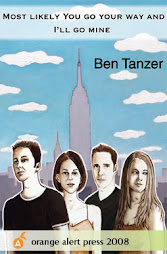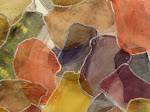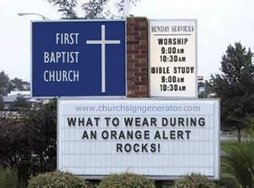 Miles Newbold Clark
Miles Newbold ClarkWhether you are a young writer just starting to scribble and revise, or you are lifetime backroom scrawler sometimes you just need someone to pay attention. Submission after submission the rejections seem to pile, and your nerve and confidence seems to wither. If you could just get your story in an anthology or on that website you will have accomplished something. You will have enough fuel to write the next and then another. You are struggling, talented, writing, full of stories and ability, waiting, and wanting. So, where do you go?
Miles Newbold Clark knows how this feels, and he knows that there are many new and inventive writers out there. In fact, one of the goals of the independent press that he helped start, No Record Press, is to publish a yearly anthology filled with writerst who do not have a record. It is a great collection to find something honest and new. Miles is a writer himself with a passion for traveling. His debut novel, None of That Will Do. Now What?, was released in May of 2007; and it is a stream-of-consciousness novel written while he was in Kyoto.
Recently, Miles was kind enough to answer a few of my questions.
Orange Alert (OA): You are the editor for No Record Press. What is the history of No Record, and what is your role as editor?
Miles Clark (MC): No Record started in late 2005. I’d taken a Greyhound bus from Vermont to San Francisco to intern at McSweeney’s, only to find they had filled their slots by the time I got there. At the “interview” where the McSweeney’s folks apologized, I met a man who was being similarly snubbed (though he lived only a few miles away). We started exchanging work, and eventually he told me he was interested in starting a small press which would publish “new” literary fiction writers exclusively. Originally the plan was to come out with a yearly anthology of short stories by previously-unpublished, non-MFA writers. We produce one of these every year. We’ve also published three novels, and the occasional flyer filled with poetry.
Like editors at most small ventures, I juggle a wide variety of tasks – everything from writing website copy to designing our books. There are five other folks on our staff, and they are a great help. As far as editing with a capital E, I handle most of it, and tend to be aggressive, probably more so than most other editors. Virtually every story in our anthologies goes through at least four rounds of revisions; some go through as many as 10 or 11. This is especially true when we’re chiseling a stand-alone excerpt from a novel.
OA: Your debut novel, None of That Will Do. Now What?, seems fascinating from the except that can be read on the No Record website. What can you tell us about your novel?
MC: I wrote this during a summer when I was living in an apartment complex on a hillside in Kyoto. The heat was oppressive. There were monkeys who lived at the top of the hill, who used to come down to the apartment playground before being beaten back into the forest by baton-wielding police. I’d been spending a lot of time at Zen gardens and doing meditation. I’d also reached an impasse with another novel-length project. I decided I needed a clean start. I walked to a vending machine, bought a few beers, and decided I’d spend three days writing about a man who confronts personal failure and the death of a friend. Because it was written so quickly, my immediate surroundings had a considerable impact on the novel as a whole. So the monkeys and the meditation and the heat factored in. The result is definitely mixed. The protagonist is fighting against answers to questions that should be simple. The pacing drags in parts, and the ending needs more moral oomph. Writers overly concerned with form and structure tend to dismiss it entirely. Other folks who are more comfortable with the rough edges of the text seem to enjoy it. Sometimes I wish it had looked more like a Zen garden. But overall, I’m satisfied with the result.
OA: I've read that you like to travel. What role do your travels play in your writing? What is the most interesting place you have visited?
MC: Exile is supposed to be the harbinger of creative industry, and I’m no exception. I do most of my writing when I travel. The most striking place I’ve been is probably Alaska, where I spent a summer working at a boat launch owned by a Unangen fisherman. Every one of his employees had a different American accent and a tall tale about what had brought them up there. People don’t arrive in Alaska so much as appear, and they disappear just as quickly. It’s a place that convinced me that society is fundamentally symmetrical, and that God lives in a field of corn in a valley.
OA: What are your thoughts on print-on-demand vs. off-set printing?
MC: P-O-D printing is the future of printing, the same way small presses are the future of publishing. Its impact on the publishing world will be similar to what happened when the USPS altered postal rates in the 1960’s, allowing for larger discounts on bulk/organizational mailings. In that case, the number of literary journals in the country mushroomed; in this case, more authors will be publishing books, but selling fewer of them. For the self-published author, P-O-D eliminates hassle and limits liability. There’s no inventory to store, pay for, and re-ship every time a copy is ordered. For the large publisher, offset is currently preferable; it’s still a great deal cheaper per copy than P-O-D, shipping costs are minimized through coordinated storage in regional warehouses, and the policies of the larger chain bookstores work in its favor (as these stores generally require a publisher to have thousands of copies of any stocked book in reserve in case it becomes a “hot sell.”) But the policies of an offset-driven book marketplace are antiquated. The members of Generation Y grew up in a world where most media was evolving into light and air, and we’ve become acclimated to a world where mass-produced information is as free as both. If it isn’t free, we can usually find a way to steal it, because the bureaucrats guarding the gates aren’t as tech-savvy as we are. We don’t have a problem with this, because the physical demands that previously justified the middleman have vanished, and their claim of property ownership feels artificial. They might argue that the value of their role lies in “marketing.” But our criterion for deciding whether or not to pay for entertainment isn’t based on distant spatial ownership, but close interaction in time: we read an author’s blog, post a response, receive an acknowledgment from the author and then purchase his book. The kind of elbow-grease this arrangement requires cuts out the middleman completely. It also and works against the giant print runs that make offset cheaper. And is “cheaper” really even preferable? After all, the success of mass-produced novels is famously hard to predict, and most offset fiction titles, despite cheaper production costs, actually end up in the red. Employees of the publishing industry aren’t natural market analysts. They have worked very hard for very long for very little money, and if they didn’t love books, they wouldn’t have remained in the industry. This results in an industry that’s run by zealots. Calling “big” publishing the Iran of corporate capitalism would not be an overstatement. The reason most large fiction publishers remain in business is the enormous successes of a handful of authors; the profits from a Steven King often support the operations of an entire imprint. Stuffing all these blood-red balance sheets into the closet is effective in the short term. But it’s only a matter of time until changes in our consumer behavior, augmented by the ease with which independent authors can profitably utilize P-O-D, catch up with the large New York publishers. If these zealots fail to recalibrate their passive, large-scale, propaganda-driven, 20th-century media model to the laws of a new market, they’ll wind up with a death sentence from the court of public opinion – just like the large music record labels.
OA: Does No Record accept manuscript submissions or are the authors hand-picked? What do you look for in a manuscript?
MC: Four our first anthology we solicited a great deal, but we’re increasingly able to rely on submissions coming over the transom. When looking at manuscripts, we’re trying to find something interesting – be it a character, an idea, or the rhythm of the prose – that we can work with. Uniqueness is a highly-valued attribute. And because our editorial policy is aggressive, we don’t mind it if a piece is “flawed” in some way, as long as the author’s willing to remain open-minded. Personally I tend to get overly excited about certain manuscripts, especially the experimental kind, and so the other members of the staff – which include several non-writers – provide an essential dash of sobriety.
OA: What is next for Miles Clark and No Record Press?
MC: In late 2008/early 2009 we’ll be coming out with another anthology of short stories, and a novel about an eccentric southern man chasing his eccentric sister through the south. I’m starting law school at Cornell in the Fall, confident that Ithaca’s combination of isolation and miserable winter weather will leave me plenty of time to continue editing.
Bonus Questions:
OA: Their seems to be one in every town (or at least there used to be) where is the coolest indie bookstore in your area?
MC: The Bay Area, thankfully, still has many indie stores. Green Apple Books, in San Francisco, is a bit expensive but has a fantastic selection of every genre. It’s also near a score of inexpensive Chinese restaurants, and several fantastic coffee shops – in other words, you never really have to leave.
OA: What type of music do you listen? Who are a few of your favorites?
MC: I’m pretty omnivorous when it comes to genre, though the Silver Jews and the Modern Lovers seem to be consistently in my playlist, along with Coltraine, Mingus, Poncho Sanchez and Ravi Shankar. When I took the LSAT last December I started listening to a lot of disco music. Dubiously, I have continued to do so.
For more information on Miles Newbold Clark and No Record Press you can visit their website.
+by+Nick+Volkert).jpg)

















No comments:
Post a Comment